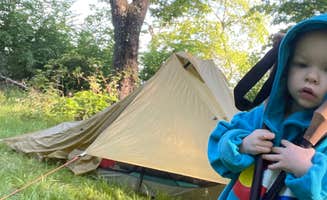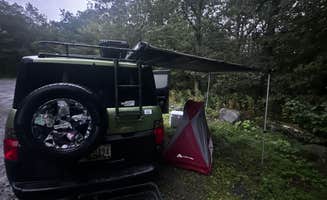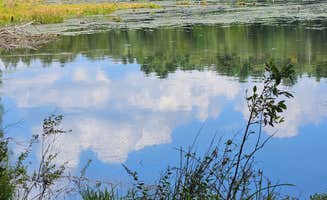Primitive camping near Mount Olive, New Jersey primarily centers around the Delaware Water Gap region and nearby state forests. The area sits at the edge of the Highlands physiographic region with elevations ranging from 500-1500 feet above sea level. Winter camping requires advanced preparation due to temperatures frequently dropping below freezing between November and March.
What to do
Hike extensive trail systems: The Thunder Swamp Trailhead offers access to numerous hiking routes through dense Pennsylvania woodland. "Tons of hiking. Went down Saw Creek trail to a marsh," notes Jason R., highlighting the diverse terrain available from this basic camping area. The trailhead serves as a practical basecamp for day hikes.
Experience backcountry solitude: At Appalachian Trail Designated Backpacker Campsite 2, hikers can find respite after traversing challenging terrain. "I gave the site only four stars because there's no water nearby, and the views are only mediocre," reports Renee Z., providing a balanced assessment of this site's limitations. Water planning is essential when staying here.
Practice primitive lakeside camping: Fishing opportunities exist at several backcountry water bodies near Mount Olive. Small ponds and streams offer seasonal catches, though regulations vary by location and require appropriate state licensing.
What campers like
Bear safety infrastructure: The bear boxes at Appalachian Trail sites provide critical wildlife protection. Katharine T. appreciated this feature, noting the campsite is "well maintained with bear boxes provided." This practical amenity addresses a genuine concern for backcountry campers in bear territory.
Hammock-friendly environments: The wooded terrain supports alternative sleeping arrangements. According to Renee Z., certain areas are "a little on the small and sloped side for tent camping, but I was in a hammock and it was a great place for that." Several sites feature mature trees properly spaced for hammock suspension.
Shade availability: Thunder Swamp Trailhead offers natural cover even in its basic setup. Benjamin H. observed: "It's a gravel parking lot. Plenty of shade. No one bothered me." This practical feature provides relief during summer months when temperatures can exceed 90°F.
What you should know
Permit requirements vary: New York state land has specific regulations for overnight stays. As Gregg T. learned at Hickok Brook: "Need a permit on NY state land. Contact Rangers office of whatever county." Always verify requirements before setting up camp.
Limited water sources: Sunfish Pond provides one of the few reliable water sources along certain sections of trail. Renee Z. advises: "Stock up on water at the Dunnfield creek natural area, or wait until Sunfish pond." All water requires filtration or treatment.
Unmarked primitive sites: Finding designated camping areas can require attention to subtle indicators. "The site itself is unmarked when you come to it, but it's the only pretty obvious camping spot on the trail so it's not hard to find," explains Renee Z. about one Appalachian Trail site.
Tips for camping with families
Choose sites with natural boundaries: Look for primitive camping areas with natural features that define spaces for children. Some spots offer rock formations or fallen logs that create natural play areas while establishing clear site boundaries.
Consider spot accessibility: Road conditions significantly impact family camping logistics. Corey's experience at Hickok Brook reveals challenges: "The road is very rough with huge potholes so good clearance is a must. It's not a good spot for car camping." Vehicle limitations affect gear transport options.
Plan for limited facilities: Appalachian Trail campsite and similar backcountry locations lack developed amenities. Families must prepare for complete self-sufficiency with portable sanitation solutions and adequate supply storage.
Tips from RVers
Vehicle clearance requirements: High-clearance vehicles perform best on primitive roads accessing backcountry sites. "I drove in thinking that there would be flat places to park a very rugged camper in my full ton diesel pickup," shares Corey about Hickok Brook, highlighting sizing misconceptions.
Off-grid capabilities: Without hookups or services, campers must plan for complete power and water independence. Solar panels, portable power stations, and sufficient water storage are essential for overnight stays exceeding 24 hours.
Alternative parking strategies: Floyd Bennett Field provides additional options for vehicle-based camping within driving distance of Mount Olive. Larger vehicles require careful research about turn-around areas and surface conditions before committing to unpaved access roads.




